5 Steps to Clearing Your Plate
(or at least making some room!)
If COVID19 wasn’t enough to topple anyone’s already unbalanced plate, there are a plethora of stressors that have emerged this year. Most notable is the racial uprising and civil rights movement which is long overdue and hopefully, results in ever-lasting and permanent changes in our society. There are also the challenges of coping day-to-day with the pandemic, trying to figure out what to do with kids who are stuck at home 24/7, zooming from your ‘home office’ 8 hours a day, home-schooling, figuring out childcare, cancelling and rescheduling vacations, grieving lost jobs, trying to navigate a f***ed up unemployment system, watching the craziness of the election, and confronting about another 100 challenges that keep piling up. Do I dare mention the likely ‘round 2’ of the shut-down?
As a therapist, I hear about all these challenges, as well as the collateral damage that a pandemic and race revolution bring forth: trauma, depression, anxiety, panic, hopelessness, and excessive consumption of alcohol, food, social media, news … anything and everything to try to get some relief and escape.
Learning to ‘clear your plate’ or at least making some room is critical in order to survive this year – this decade – this lifetime. One caveat I want to add, however, is that I fully recognize that there is no way for People of Color to take the stress of discrimination, racism, prejudice, and racial trauma (to name a few) ‘off their plates’. I understand and recognize that these stressors are systemic in nature and thus not something to ‘step away from’ at any time. I realize this is true of other marginalized, oppressed folks as well and I will try my best to offer some ideas here that are as inclusive as possible. Please, as always, take what you want, leave the rest, and know that I’m always open to feedback.
1. Name what’s on your plate
Yes, as overwhelming as that might sound, take a moment to think, journal, and/or share out loud with another, all the ‘stressors’ that are currently on your plate. It can be cathartic to draw, collage or digitally create (as I did with this graphic) all the challenges that are taking up space in your head right now. Oftentimes, our stress comes from feeling ‘overwhelmed’ because we are aware that there are many demands, worries, unfinished projects, concerns, grievances, and heartaches that are circulating in our brains and hearts. Once identified, we can explore which of these we can actually address or solve, and which we need other coping skills to support us as we work through ‘clearing our plates’.
2. Choose ONE thing at a time to address 
Part of what creates the most stress in our lives is when we feel like we have to address everything all at once. Everyone wants our attention and everything has a deadline. Once named, if you can choose just one stressor and sit with it, examine it, explore it, be curious about it, engage with it – for a limited, specified amount of time and then be done with it! Perhaps you decide on an action you can take to resolve it, hand it off to another, or simply choose to set it back on the plate. It is now not a nebulous, overwhelming stressor that is hovering – just out of reach – weighing you down – but instead, a specific, named issue that you can set about resolving. A quick note about resolving – resolving is NOT solving. Resolving simply means, “to come to a definite, or earnest decision about; determine to do something” (dictionary.com). Of course, solving is helpful too, but not always the end game!
3. Make a decision – do I keep it or let it go? 
Some of the challenges on our plates are those that we cannot address, but many are under our control. This year, we decided to let our Thanksgiving celebration go so that we can hopefully have a family gathering for Christmas. Hard choices. I haven’t had a Thanksgiving without at least one of my children in 23 years! While I am sad, I am also incredibly THANKFUL for our health! My husband and I are both essential workers, so its definitely been a challenge to stay healthy! As difficult as it is, once you’ve made a decision to let something go, or keep it, life gets a little easier. The ambivalence, back and forth, indecisiveness is most stressful. Your brain seek certainty, so help it out!
Another helpful strategy is to know when something is not in your control ~ and let that go! This quote by Byron Katie sums it up well:
I can find only three kinds of business in the universe: mine, yours and God’s. Much of our stress comes from mentally living out of our business. When I think, “You need to get a job, I want you to be happy, you should be on time, you need to take better care of yourself,” I am in your business. When I’m worried about earthquakes, floods, war, or when I will die, I am in God’s business. If I am mentally in your business or in God’s business, the effect is separation. Byron Katie
Tell the truth about whether you are in your own business or not. Is it truly something you have the ability to address, the power to control, or no? If the worry or concern is not under your control, make a decision to let it go – hand it off – set it down. It isn’t a simple practice, but it is an important practice.
4. Let it go!
This phrase is used ad nauseam – even by me 🤦🏻♀️ ! HOWEVER, it is used because it is so important to practice! The problem is that everyone says ‘let it go’ but no one usually tells you what the heck that means! So here’s some suggestions about how to actually ‘let it go’ ~ an issue, a stressor, a troubling thought, or expectation.
Close your eyes and bring to mind an image of that which you want to let go right now – not necessarily forever, or even for the week, maybe just for today – and take a deep breath. Imagine that the issue you are releasing slowly begins to float above you…higher and higher…into the clouds…beyond the clouds…becoming smaller and smaller until you can no longer see it at all. Breathe. Notice how you feel in your body with this issue gone for now.
If you believe in God or a Higher Power, you may raise the issue up and gently place it in your God’s hands, in the hands of your Higher Power and ask them to take it away.
Set it on a shelf or in a locked box. Close your eyes, and bring an image of that which you want to let go right now. Imagine that you place it on a high shelf, out of reach for now. Leave it there and walk away. Breathe. Notice how you feel as you let it go and leave it there. You can also imagine putting it in a box and lock it – put the key in your pocket if you wish, or on top of the box – and walk away. Breathe. Notice how you feel as you let it go and leave it there.
Let it float away. Another wonderful strategy – called leaves on a stream – is a meditation practice where you let your thoughts go, you let them float away like leaves on a stream. You write the word describing the issue that you are letting go onto your leaf, or bring an image of your issue into your mind and gently place it onto the leaf. This is a wonderful practice for calming, soothing, and letting go of distressing thoughts.
Leaves on a Stream Meditation
5. Ask for HELP or SUPPORT
For some people, this step is the hardest. Letting others support you – especially when everyone is stressed out – is really tough! Brene Brown has this wonderful podcast about ‘comparative suffering’ :
“We have collectively hit weary. This is especially true for the brave folks on the front lines of this pandemic and for the people who love and support them. And, it’s also true for all of us. In this episode, I talk about strategies for falling apart, staying connected + kind, and giving ourselves permission to feel hard things.” Brene Brown
She offers an exercise where you ask your loved ones to rate how much they have to give and how full they are at any given time. So, on a scale of 1-100, if I’m at a 10 (totally stressed) with little to give, and you are at a 60, you are much more likely able to help me and our family than I am. It is a great communication tool and resource! Here is the link again: Brene Brown Unlocking Us Comparative Suffering

Reach out to a friend, call and get a therapy appointment, let someone else do the grocery shopping, get take-out instead of making dinner, let someone read to your kids for an hour (over zoom!), ask for an extension for a work project, or homework for your kids, vent to your bff, or check out the resources that I list in my most recent newsletter. You KNOW what support you need – take a risk, be courageous, ASK FOR HELP!
Bonus Tip:
This might seem contrary to my advice above, but I have found that giving to others has been a saving grace for me during this pandemic. Getting out of my own head, my own misery and suffering, and being of service or giving a thoughtful gift has absolutely shifted my mood. Venmoing my daughters a surprise gift for a nice dinner, a card sent to my niblings, flowers for my friend, Ben & Jerry’s Cherry Garcia ice cream for my husband, phone banking for Biden, and post-carding for the Georgia run off are some of the little ways that I have been or service or acted out of generosity instead of misery. CAVEAT: Give only if it feels good and lightens your load, not adds to it!
NAMASTE ~ HAVE A BLESSED THANKSGIVING!


